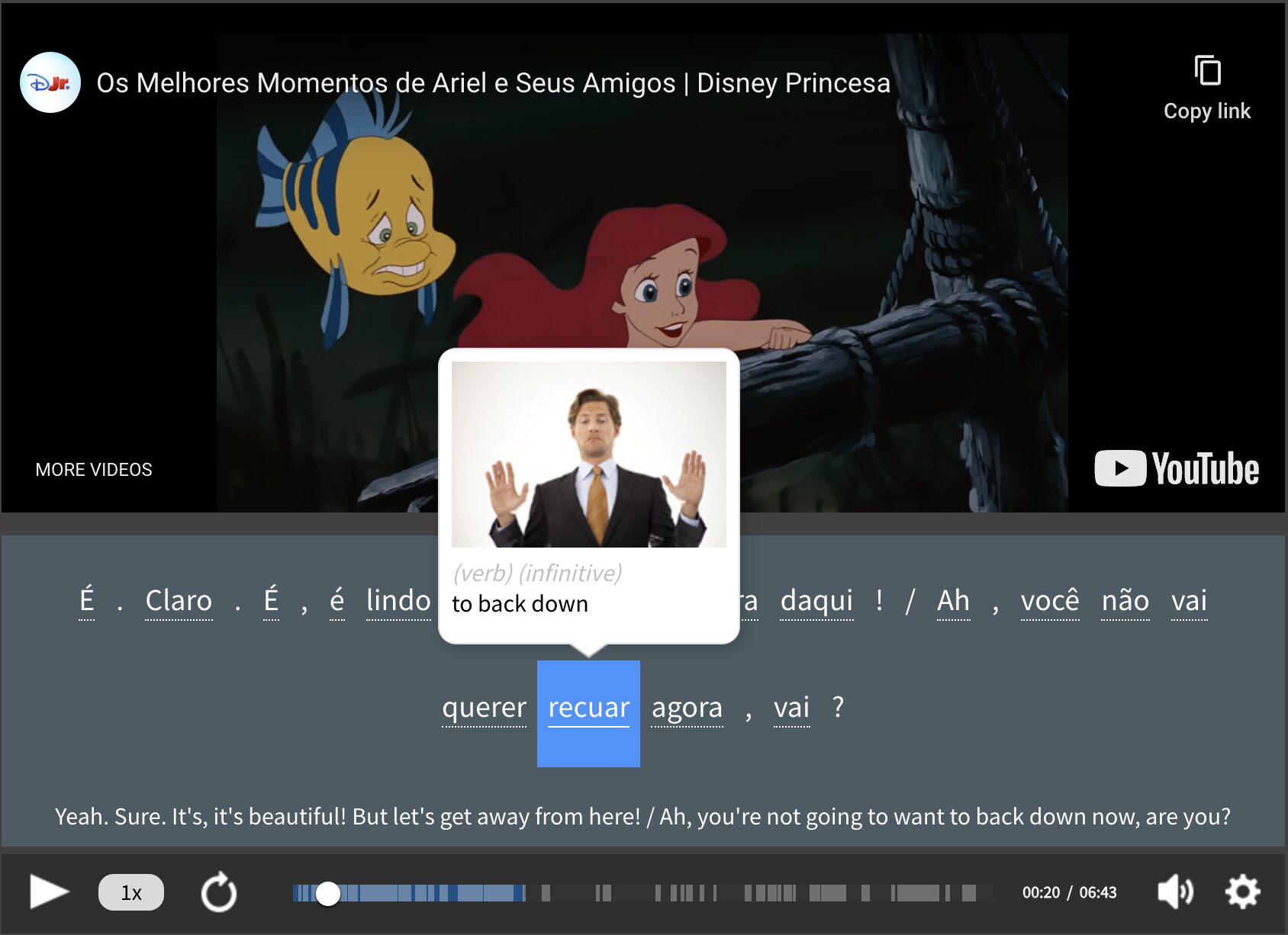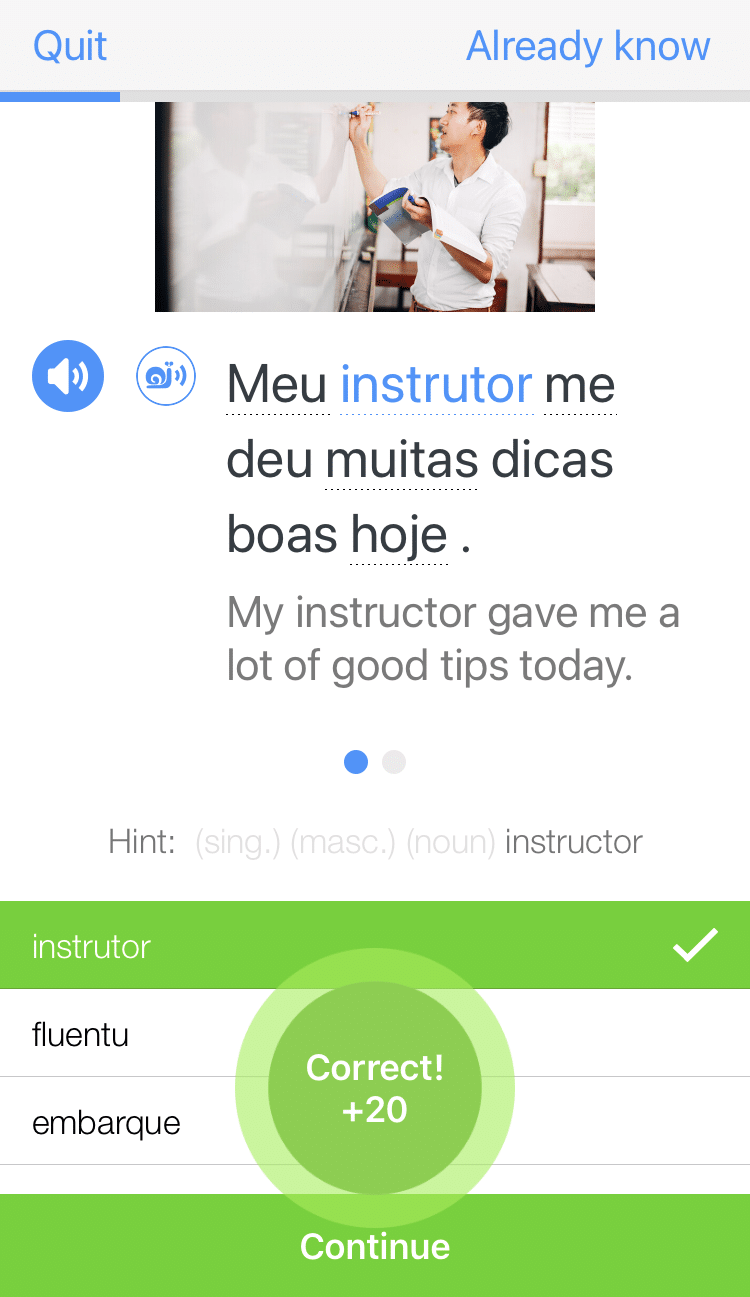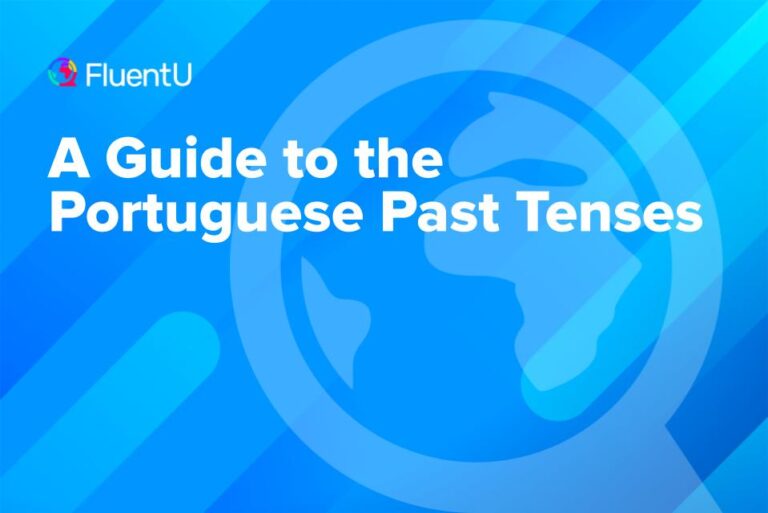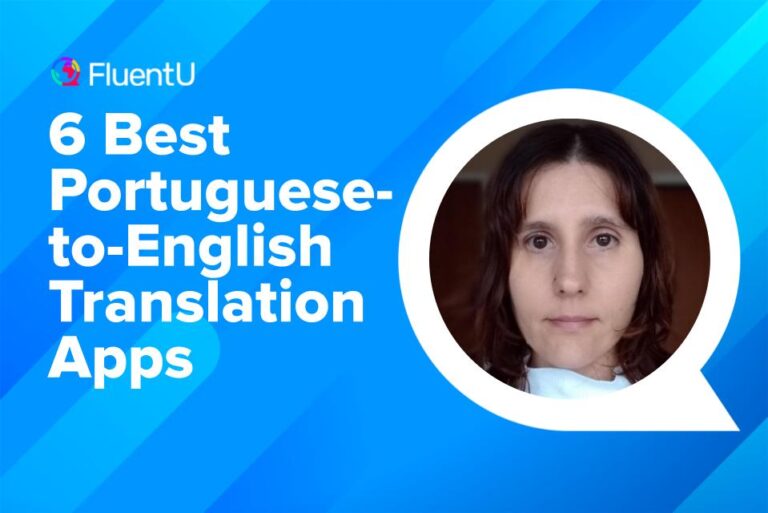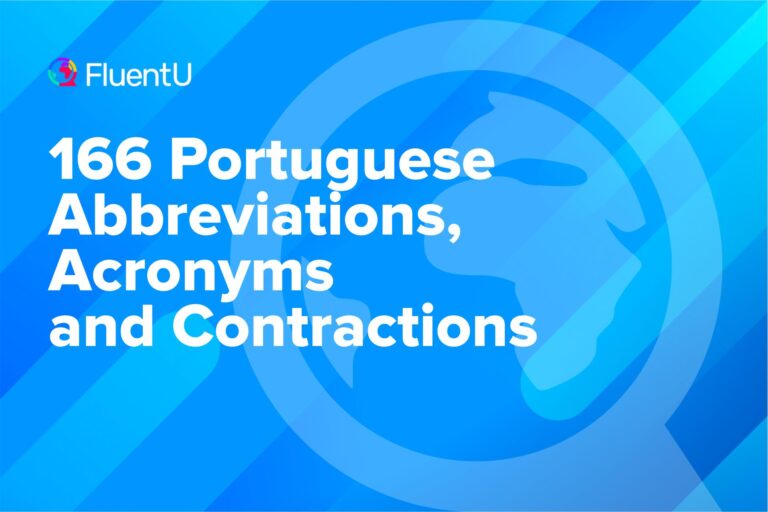Contents
- Identical English-Portuguese Cognates
- -ly → -mente Adverb Cognates
- -ty → -dade Feminine Cognates
- -ent → -ente Cognates
- -ive → -ivo/-iva Gendered Cognates
- -ous → -oso/-osa Cognates
- -ble → -vel Cognates
- –tion/-sion → -ção/-são Open-ended Cognates
- -ist → -ista Cognates
- English-Portuguese False Friends
- And One More Thing...
60+ English Portuguese Cognates

English-Portuguese cognates—or words shared by two languages that look and sound similar and share the same meaning—are a goldmine of Portuguese vocabulary you haven’t dug into yet.
These words are extremely useful to know and the easiest to learn. Discover over 60 English-Portuguese cognates and several false friends—words that look like cognates but aren’t.
Download: This blog post is available as a convenient and portable PDF that you can take anywhere. Click here to get a copy. (Download)
Identical English-Portuguese Cognates
These cognates are spelled the exact same in Portuguese as in English. The only difference is their pronunciation.
| Portuguese | English |
|---|---|
| Animal | Animal |
| Natural | Natural |
| Real | Real |
| Social | Social |
| Vital | Vital |
| Original | Original |
| Total | Total |
| Chocolate | Chocolate |
| Banana | Banana |
| Cinema | Cinema |
| Rádio | Radio |
| Crime | Crime |
| Familiar | Familiar |
| Zero | Zero |
-ly → -mente Adverb Cognates
You’ll find that a lot of English adverbs ending in -ly can easily be converted into Portuguese by switching the ending to -mente.
Place the stress on the –me- in the Portuguese version.
| Portuguese | English |
|---|---|
| Realmente | Really |
| Basicamente | Basically |
| Historicamente | Historically |
| Automaticamente | Automatically |
| Oralmente | Orally |
| Naturalmente | Naturally |
-ty → -dade Feminine Cognates
You can generally transform English -ty words into their Portuguese equivalent by changing the ending to -dade.
Note that Portuguese words ending in -dade are feminine.
The stress here is placed on the -da- of the Portuguese word.
| Portuguese | English |
|---|---|
| A cidade | The city |
| A universidade | The university |
| A honestidade | The honesty |
| A simplicidade | The simplicity |
| A velocidade | The velocity |
-ent → -ente Cognates
This one works with both nouns and adjectives and is relatively straightforward. In this case, the stress falls on the -e- of -ente:
| Portuguese | English |
|---|---|
| Diferente | Different |
| Presidente | President |
| Recente | Recent |
| Componente | Component |
| Inocente | Innocent |
| Residente | Resident |
| Excelente | Excellent |
| Consistente | Consistent |
Watch out for those double letters in English.
As you’ll notice in some of the above examples (such as “innocent” and “inocente”), they don’t carry over to their Portuguese counterparts.
-ive → -ivo/-iva Gendered Cognates
In this instance, you’ll convert English nouns and adjectives ending in -ive into Portuguese words ending in -ivo (if the subject is masculine) and -iva (if the subject is feminine).
| Portuguese | English |
|---|---|
| Positivo
(masc.) Positiva (fem.) | Positive |
| Executivo
(masc.) Executiva (fem.) | Executive |
| Criativo
(masc.) Criativa (fem.) | Creative |
| Competitivo
(masc.) Competitiva (fem.) | Competitive |
| Narrativa | Narrative |
| Motivo | Motive |
| Incentivo | Incentive |
Not to complicate things, but there is such thing as motiva. It’s the female third person singular for the verb motivar (to motivate).
Likewise, incentiva is the female third person singular for the verb incentivar (to incentivize).
Neither word applies here since we’re talking about nouns, not verbs.
-ous → -oso/-osa Cognates
Once again, these cognates are gendered according to whether the subject is male or female.
| Portuguese | English |
|---|---|
| Religioso
(masc.) Religiosa (fem.) | Religious |
| Famoso
(masc.) Famosa (fem.) | Famous |
| Misterioso
(masc.) Misteriosa (fem.) | Mysterious |
| Generoso
(masc.) Generosa (fem.) | Generous |
| Ambicioso
(masc.) Ambiciosa (fem.) | Ambitious |
-ble → -vel Cognates
This one covers the English -able and -ible cognates.
The Portuguese equivalents are -ável and -ível.
| Portuguese | English |
|---|---|
| Possível | Possible |
| Responsável | Responsible |
| Impossível | Impossible |
| Terrível | Terrible |
| Vulnerável | Vulnerable |
| Confortável | Comfortable |
–tion/-sion → -ção/-são Open-ended Cognates
Portuguese words ending in -ção and -são are feminine.
As far as pronunciation is concerned, the Portuguese tilde (accent mark) is the most challenging part. You should definitely listen to these words a few times and repeat them to yourself to practice your enunciation.
For English words ending in -tion, change the ending to -ção.
And for English words ending in -sion, use the ending -são.
| Portuguese | English |
|---|---|
| Situação | Situation |
| Comunicação | Communication |
| Informação | Information |
| Educação | Education |
| Televisão | Television |
| Expressão | Expression |
| Conclusão | Conclusion |
| Missão | Mission |
-ist → -ista Cognates
These words are normally gender-neutral—you need to add the right definite article before them (o for males and a for females) to correspond with the person you’re talking about.
| Portuguese | English |
|---|---|
| Dentista | Dentist |
| Comunista | Communist |
| Jornalista | Journalist |
| Especialista | Specialist |
| Artista | Artist |
| Economista | Economist |
| Feminista | Feminist |
English-Portuguese False Friends
A false friend is a word that looks like a cognate but actually isn’t.
Here are a few of the most common English-Portuguese false friends:
| Portuguese | English |
|---|---|
| Atualmente | Currently (Mistake: actually) |
| Argumento | Reasoning (Mistake: argument) |
| Balcão | Counter (Mistake: balcony) |
| Compromisso | Appointment (Mistake: compromise) |
| Costume | Custom, tradition (Mistake: costume) |
| Data | Date (Mistake: data) |
| Dececionar | To disappoint (Mistake: to deceive) |
| Esperto | Smart (Mistake: expert) |
| Eventualmente | Maybe (Mistake: eventually) |
| Injúria | Insult (Mistake: injury) |
| Jornal | Newspaper (Mistake: journal) |
| Notícia | News (Mistake: notice) |
| Pretender | To intend (Mistake: to pretend) |
| Recordar | To remember (Mistake: to record) |
| Retirar | To withdraw (Mistake: to retire) |
| Taxa | Rate, fee (Mistake: tax) |
Believe it or not, this is barely an intro to all the English-Portuguese cognates out there!
You’ll discover a trove of other patterns and groupings just by engaging with Portuguese media, such as movies, books, videos, etc.
FluentU even lets you learn cognates through context with authentic Portuguese videos, thanks to the interactive subtitles that let you click on words you don’t know.
FluentU takes authentic videos—like music videos, movie trailers, news and inspiring talks—and turns them into personalized language learning lessons.
You can try FluentU for free for 2 weeks. Click here to check out the website or download the iOS app or Android app.
I hope this post inspires you to delve further into the knowledge you already have as you continue your Portuguese fluency journey!
Download: This blog post is available as a convenient and portable PDF that you can take anywhere. Click here to get a copy. (Download)
And One More Thing...
If you're like me and enjoy learning Portuguese through movies and other media, you should check out FluentU. With FluentU, you can turn any subtitled content on YouTube or Netflix into an engaging language lesson.
I also love that FluentU has a huge library of videos picked specifically for Portuguese learners. No more searching for good content—it's all in one place!
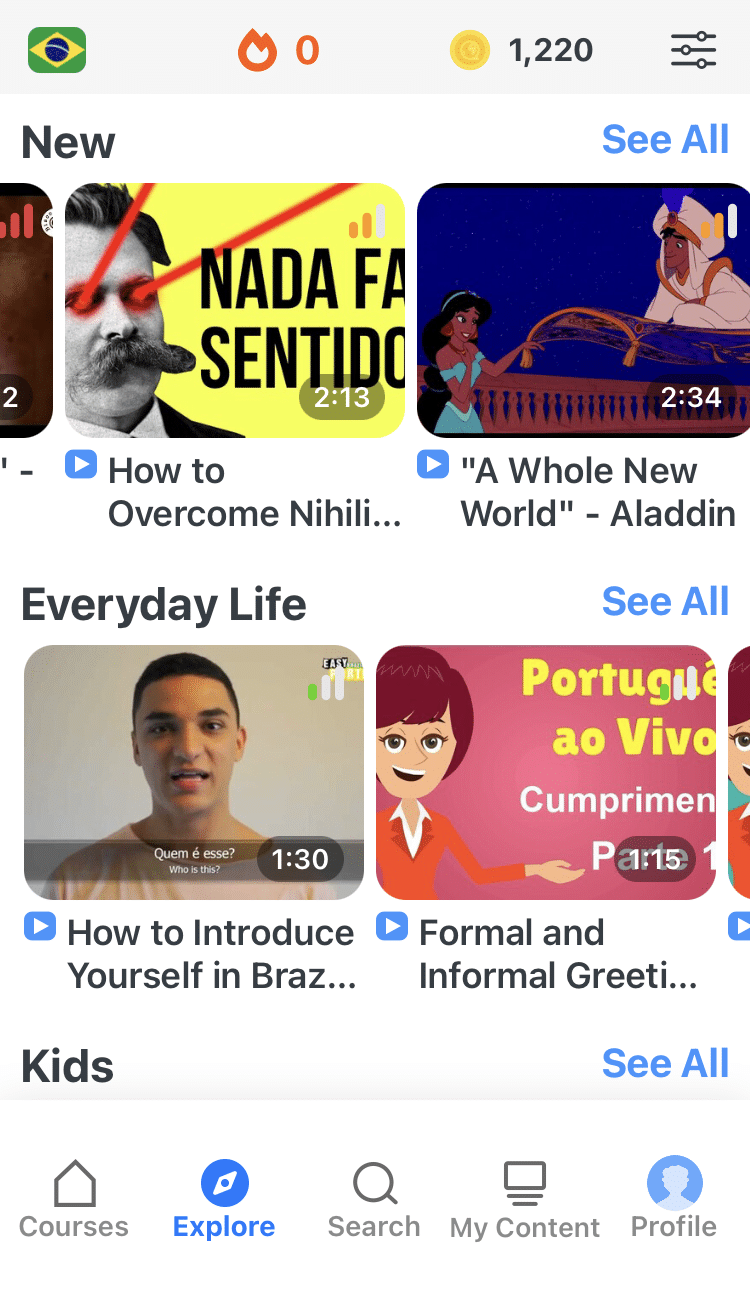
One of my favorite features is the interactive captions. You can tap on any word to see an image, definition, and examples, which makes it so much easier to understand and remember.
And if you're worried about forgetting new words, FluentU has you covered. You'll complete fun exercises to reinforce vocabulary and be reminded when it’s time to review, so you actually retain what you’ve learned.
You can use FluentU on your computer or tablet, or download the app from the App Store or Google Play. Click here to take advantage of our current sale! (Expires at the end of this month.)

